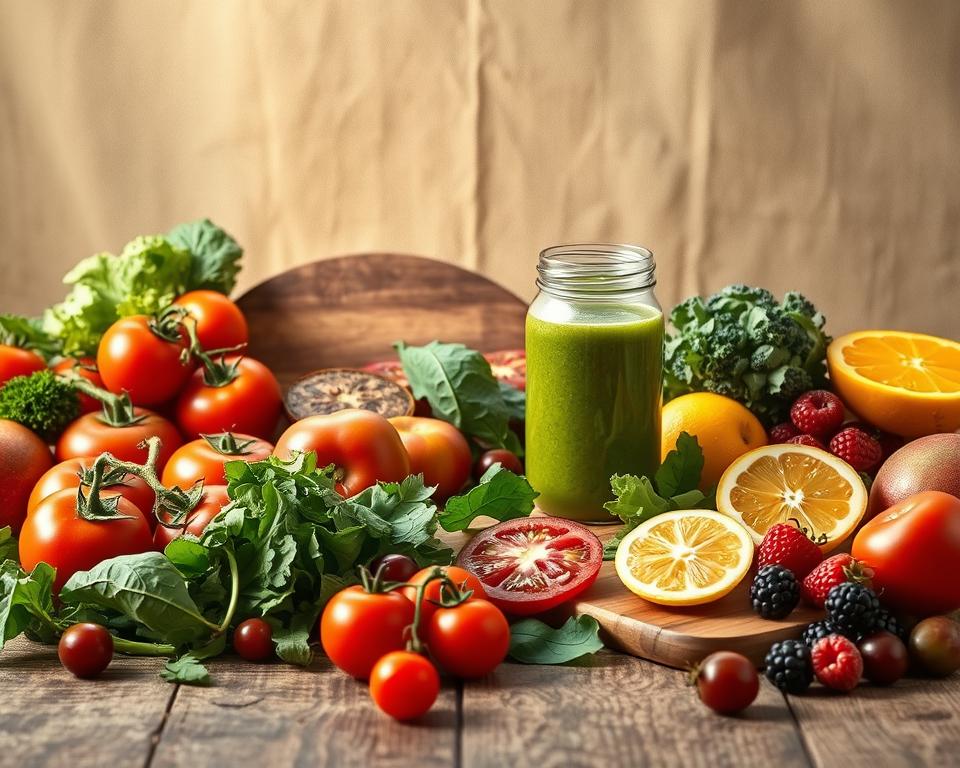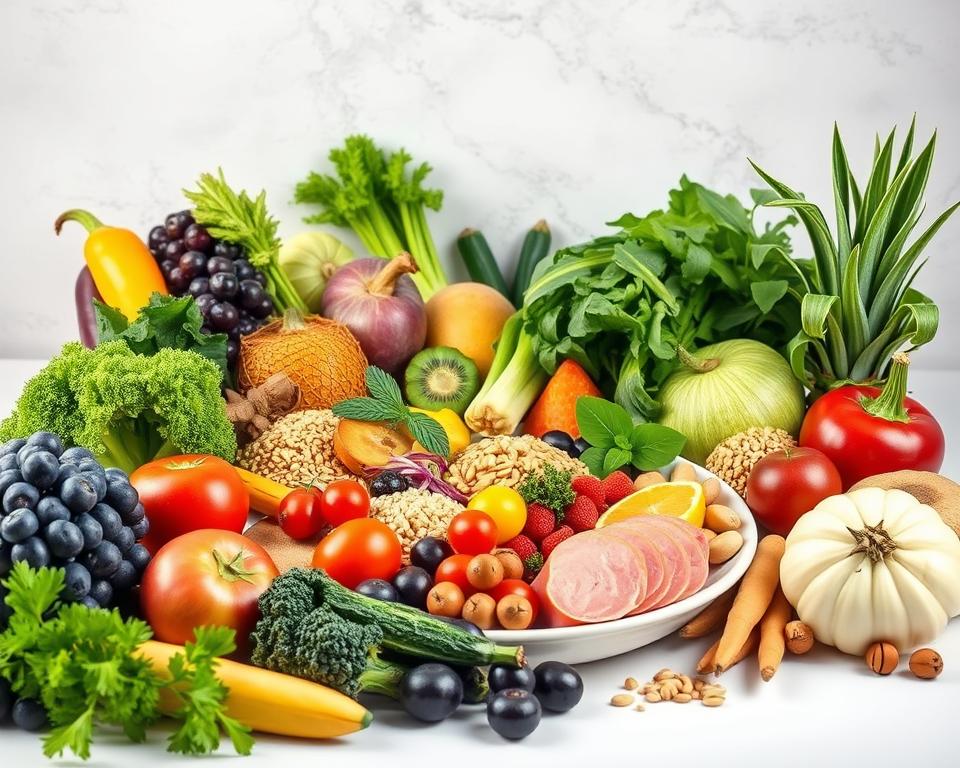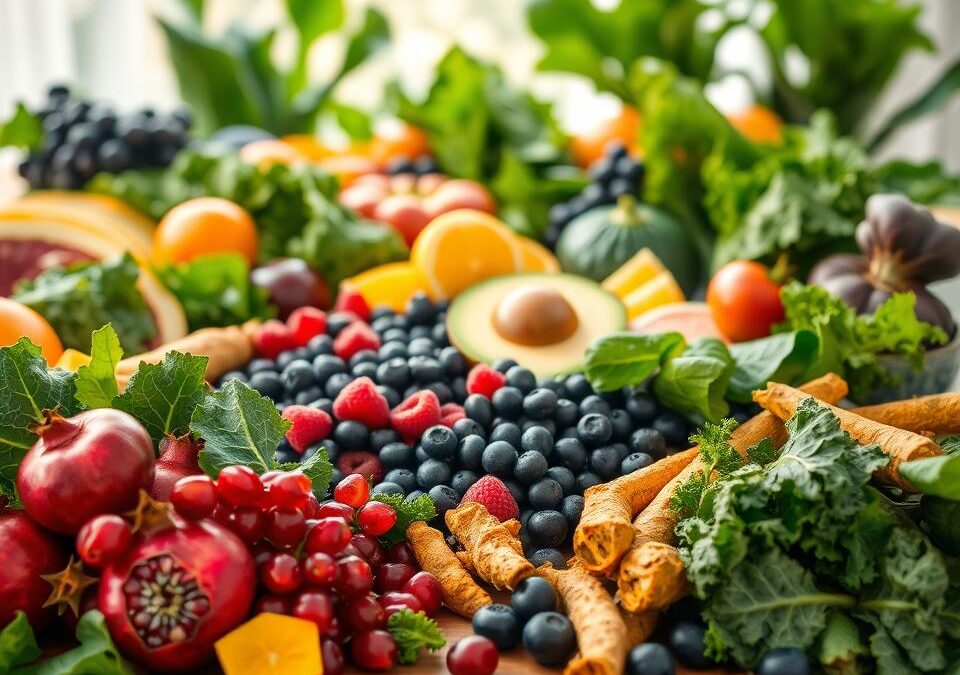Can the food on your plate really help fight off a serious disease like cancer? Yes, it can! You’ll learn how your cancer prevention diet is key to your health.
Welcome to our guide on the Mediterranean diet and anti-cancer foods. We’ll look at how certain foods can lower your risk. You’ll get a plan to eat healthier and feel better.
Let’s start this journey to a healthier you!
Get well and stay well, Ray Baker.
The Science Behind Food and Cancer Prevention
Eating the right foods can help lower our chance of getting cancer. It’s true! What we eat affects our risk of cancer. Knowing this helps us make better choices for our health.

How Dietary Choices Influence Cancer Risk
Studies show that some foods can change our cancer risk. Eating lots of fruits, veggies, and whole grains can protect us. These foods have antioxidants and nutrients that guard our cells.
The Power of Antioxidants and Anti-inflammatory Foods
Foods like berries and leafy greens fight free radicals. Free radicals can harm cells and cause cancer. Foods like turmeric and green tea also help by reducing inflammation. Adding these to our diet helps prevent cancer.
What Is a Cancer Prevention Diet?
A cancer prevention diet is about eating foods that help lower cancer risk. By choosing the right foods, you can help protect yourself from cancer.
The Mediterranean diet is at the heart of this approach. It includes whole grains, fruits, veggies, and healthy fats. Studies show it can help prevent many cancers.
Mediterranean Diet as a Foundation
The Mediterranean diet is known for its health benefits, including fighting cancer. It focuses on:
- Whole grains
- Fresh fruits and vegetables
- Legumes
- Nuts and seeds
- Healthy fats, such as olive oil
Following this diet can greatly improve your health and lower cancer risk.
Key Nutritional Principles for Cancer Prevention
Along with the Mediterranean diet, there are other important nutritional tips for cancer prevention. These include eating foods full of antioxidants and anti-inflammatory compounds.
When making your diet plan, remember to:
- Eat more fruits and vegetables
- Add legumes and whole grains to your meals
- Choose healthy fats like olive oil and nuts

By mixing these tips with the Mediterranean diet, you can create a diet plan that fights cancer.
The 15 Most Powerful Cancer-Fighting Foods
Find out the 15 top foods that fight cancer. You can add them to your meals every day. They are chosen based on the latest science to lower your cancer risk.
How These Superfoods Were Selected
We picked these 15 foods for their anti-cancer properties. They are full of antioxidants, fiber, and nutrients that fight cancer. They help reduce inflammation, boost your immune system, and attack cancer cells.
Overview of Their Cancer-Fighting Properties
These 15 foods are loaded with nutrients that fight cancer. For example, broccoli has sulforaphane, which fights cancer. Berries are full of antioxidants that protect cells. Green tea and turmeric have compounds that fight inflammation and cancer.
| Food | Cancer-Fighting Property |
|---|---|
| Broccoli | Contains sulforaphane, which has anti-cancer effects |
| Blueberries | Rich in antioxidants that protect cells from damage |
| Turmeric | Contains curcumin, which has anti-inflammatory and anti-cancer properties |
Cruciferous Vegetables: Your First Line of Defense
Cruciferous vegetables are great for fighting cancer. They are full of vitamins and minerals. These help fight cancer. Let’s look at some of the best ones and how to add them to your meals.
1. Broccoli: The Sulforaphane Powerhouse
Broccoli is very good for you. It has a lot of sulforaphane. This helps fight cancer. Sulforaphane stops cancer cells from growing and makes them die.
You can eat broccoli many ways. Try it steamed, roasted, or in salads.
2. Kale: Nutrient-Dense Cancer Fighter
Kale is full of vitamins and minerals. It has lots of antioxidants. These help fight cancer.
Kale is easy to use in many dishes. Add it to smoothies, sauté it, or make a salad base.
3. Brussels Sprouts: Small Size, Big Benefits
Brussels sprouts are small but very nutritious. They have compounds that fight cancer. Roasting makes them sweet and tasty.
To roast, trim and cut in half. Toss with olive oil, salt, and pepper. Roast at 400°F (200°C) until brown.
Adding these veggies to your diet helps prevent cancer. Knowing their benefits and how to cook them is key. This way, you can take charge of your health and make smart food choices.
Berries and Fruits That Combat Cancer Cells
Certain berries and fruits are great for fighting cancer. They are tasty and full of nutrients that help protect us.
Blueberries: Antioxidant Superstars
Blueberries are full of antioxidants. They are a strong tool against cancer. The anthocyanins in blueberries stop cancer cells from growing and can make them die.
Strawberries: Vitamin C Champions
Strawberries are rich in antioxidants and vitamins, like vitamin C. Vitamin C helps our immune system and fights cancer cells.
Citrus Fruits: Limonene and Cancer Prevention
Citrus fruits like oranges and lemons have limonene. This helps fight cancer. Limonene makes cancer cells die and stops tumors from growing.
| Fruit | Key Antioxidant | Cancer-Fighting Benefit |
|---|---|---|
| Blueberries | Anthocyanins | Inhibit cancer cell growth |
| Strawberries | Vitamin C | Boosts immune system |
| Citrus Fruits | Limonene | Induces apoptosis in cancer cells |
Eating different berries and fruits helps fight cancer. So, let’s add them to our meals every day!
“A diet rich in fruits and vegetables can help reduce the risk of certain cancers.” – American Cancer Society
Plant Proteins and Whole Grains for Cancer Prevention
Eating plant proteins and whole grains can help prevent cancer. These foods are full of essential fiber, vitamins, and minerals. They protect us from cancer. Let’s see how to add them to our meals.
7. Beans and Lentils: Fiber-Rich Protection
Beans and lentils are full of plant proteins and fiber. They are key for a cancer-fighting diet. A diet high in fiber can lower the risk of colorectal cancer. Add beans and lentils to soups, salads, or main dishes!
8. Walnuts: Omega-3 Powerhouses
Walnuts are rich in omega-3 fatty acids and antioxidants. These help fight cancer. Enjoy walnuts as a snack or add them to oatmeal or salads.
9. Whole Grains: The Fiber Connection
Whole grains like brown rice, quinoa, and whole wheat bread are full of fiber and nutrients. They keep our digestive system healthy and lower cancer risk. Choose whole grains over refined ones for the best benefits!
By eating plant proteins and whole grains, you’re doing more than just eating well. You’re taking steps to prevent cancer. Start with small changes, like using whole grains instead of refined ones or adding beans to your recipes.
Cancer-Fighting Herbs, Spices, and Beverages
Let’s look at herbs, spices, and drinks that fight cancer. For ages, people have used these for health. Now, science is finding they can fight cancer too.
Turmeric: Curcumin’s Anti-Cancer Properties
Turmeric is common in Indian food. It has curcumin, which fights inflammation and cancer. It can stop cancer cells from growing and even kill them. Try turmeric in curries, soups, or as tea to get its benefits.
Garlic: Allicin and Immune Support
Garlic does more than taste good; it boosts your immune system and fights cancer. Allicin, made when garlic is crushed, fights tumors and boosts your defenses. Add garlic to your food or take supplements to help fight cancer.
Green Tea: Catechins Against Cancer
Green tea is full of antioxidants called catechins. They help fight cancer. EGCG, a key catechin, stops cancer cells from growing and dying. Drinking green tea often can help keep you healthy and fight cancer.
| Herb/Spice/Beverage | Key Compound | Anti-Cancer Benefit |
|---|---|---|
| Turmeric | Curcumin | Inhibits cancer cell growth, induces apoptosis |
| Garlic | Allicin | Anti-tumor effects, immune support |
| Green Tea | EGCG (Catechins) | Inhibits cancer cell growth, induces apoptosis |
Healthy Fats and Proteins in Your Cancer Prevention Diet
Adding healthy fats and proteins to your diet is key to fighting cancer! These foods give you energy and help your body in many ways. They can protect you from cancer. Let’s look at some great healthy fats and proteins for your meals.
Olive Oil: Mediterranean Magic
Olive oil is a big part of the Mediterranean diet. It’s full of monounsaturated fats that fight inflammation. Oleic acid in olive oil also fights cancer. Use it for cooking and in dressings and marinades.
“The Mediterranean diet, rich in olive oil, lowers cancer risk,” a study found.
Fatty Fish: Omega-3 Benefits
Fatty fish like salmon, mackerel, and sardines are full of omega-3 fatty acids. These fats reduce inflammation and help prevent cancer. They also keep your heart healthy and lower cancer risk.
- Salmon: Rich in omega-3s and protein
- Mackerel: High in EPA and DHA
- Sardines: Packed with nutrients and low in mercury
Tomatoes: Lycopene’s Protective Effects
Tomatoes are full of lycopene, an antioxidant that fights cancer. Lycopene protects cells and boosts health. Cooked tomatoes are best because cooking makes lycopene easier for your body to use.
To eat more tomatoes, make homemade tomato sauce. Add fresh tomatoes to salads or soups.
By eating these healthy fats and proteins, you’re helping prevent cancer. A balanced diet and a healthy lifestyle are very important for your health!
How to Create Your Weekly Cancer Prevention Meal Plan
Now that we’ve talked about foods that fight cancer, let’s make a meal plan for you! Making a meal plan might seem hard, but it’s easy when you break it down. You’ll be on your way to a healthier life in no time.
Step 1: Assess Your Current Diet
First, look at what you eat now. Keep a food diary for a few days. This will show you what to cut back on and what you’re getting right.
- Track your daily food intake for a week
- Identify patterns and areas for improvement
- Make a list of foods you need to limit or avoid
Step 2: Gradually Incorporate Cancer-Fighting Foods
After you know your diet, add more foods that fight cancer. Start small, like adding fruits or veggies to your meals. Then, add more variety and bigger portions over time.
Some tips to keep in mind:
- Start with one or two new foods per week
- Try different recipes and cooking ways
- Make sure your plate has lots of colors
Step 3: Follow a 7-Day Sample Menu
Here’s a 7-day menu with foods that fight cancer:
- Monday: Breakfast – Oatmeal with berries and walnuts; Lunch – Grilled chicken with roasted veggies; Dinner – Quinoa and black bean bowl with avocado
- Tuesday: Breakfast – Greek yogurt with citrus fruits and almonds; Lunch – Whole grain pita with hummus and veggies; Dinner – Grilled salmon with brown rice and steamed broccoli
- Wednesday: Breakfast – Smoothie bowl with spinach, banana, and almond milk topped with chia seeds; Lunch – Lentil soup with whole grain bread; Dinner – Grilled turkey with roasted sweet potatoes and green beans
- Thursday: Breakfast – Scrambled eggs with sautéed kale and whole grain toast; Lunch – Grilled chicken Caesar salad; Dinner – Baked chicken with quinoa and steamed asparagus
- Friday: Breakfast – Avocado toast on whole grain bread with a fried egg; Lunch – Grilled chicken wrap with mixed greens and whole grain wrap; Dinner – Shrimp and vegetable stir-fry with brown rice
- Saturday: Breakfast – Overnight oats with berries and almonds; Lunch – Grilled chicken breast with mixed greens salad; Dinner – Baked salmon with roasted Brussels sprouts and sweet potatoes
- Sunday: Breakfast – Breakfast burrito with scrambled eggs, black beans, and avocado; Lunch – Turkey and avocado wrap with mixed greens; Dinner – Grilled chicken with roasted carrots and parsnips
By following these steps and adding more cancer-fighting foods, you’ll make a meal plan that helps you fight cancer!
Conclusion: Embracing a Lifelong Cancer Prevention Strategy
As we finish this guide, it’s clear that fighting cancer is a long-term job. It’s not just about quick fixes. It’s about making healthy choices every day.
Every time you eat, you can help keep your body safe from cancer. Try to eat healthy foods all the time. This way, you’ll be taking care of your body and fighting cancer.
Let’s focus on being healthy, one meal at a time. By choosing healthy foods, we can take charge of our health. And we can live our lives fully.
Get well and stay well,
Ray.
FAQ
What is a cancer prevention diet?
A cancer prevention diet focuses on foods that lower cancer risk. It includes whole grains, fruits, veggies, and healthy fats. The Mediterranean diet is a great example.
How do antioxidants help in cancer prevention?
Antioxidants protect cells from damage by free radicals. This can help prevent cancer. Foods like berries and leafy greens are full of antioxidants.
What are some examples of cancer-fighting foods?
Foods like broccoli and kale are good for fighting cancer. So are fruits like blueberries and strawberries. Healthy fats, like olive oil, also help.
Can I start a cancer prevention diet if I have dietary restrictions?
Yes, you can! A cancer prevention diet can fit many dietary needs. Even if you’re gluten-free or vegan, you can still enjoy the Mediterranean diet.
How do I incorporate cancer-fighting foods into my daily meals?
Start small. Add berries to your oatmeal or snack on raw veggies with hummus. Try new recipes with cancer-fighting foods too.
Are there any specific cooking methods that can help preserve the nutritional value of cancer-fighting foods?
Yes! Steaming, roasting, and grilling are good. They keep nutrients in food. But avoid overcooking or frying, as they can destroy nutrients.
Can a cancer prevention diet guarantee that I won’t develop cancer?
A cancer prevention diet can lower your cancer risk. But remember, cancer is complex. A healthy diet is part of a bigger plan to prevent cancer.
How long does it take to see the benefits of a cancer prevention diet?
You’ll see benefits over time, usually months or years. Keep eating healthy and add other good habits to your life.


